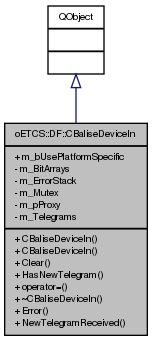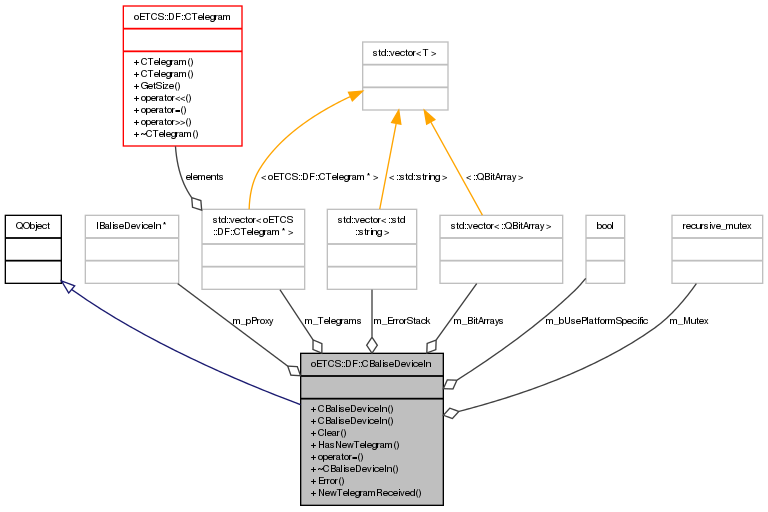base class for all balise devices for incomming messages More...
#include <PlatformSpecificClientsMOC.h>


Public Slots | |
| void | Error (const QString &ErrorMessage) |
| informs the stub about an error ocurred in the PS part | |
| void | NewTelegramReceived (const QByteArray &Bytes, int iBits) |
| informs the stub about a new telegram available | |
Public Member Functions | |
| CBaliseDeviceIn (const ::std::vector< oETCS::DF::CTelegram * > &Telegrams, const bool &bUsePS=false) throw () | |
| general constructor | |
| CBaliseDeviceIn (const CBaliseDeviceIn &Source) | |
| deleted copy constructor | |
| void | Clear () throw () |
| clears all bit arrays | |
| ::std::vector< unsigned char > | HasNewTelegram () throw (::oETCS::DF::Error::CException) |
| gets flag for a new telegram | |
| CBaliseDeviceIn & | operator= (const CBaliseDeviceIn &Source) |
| deleted assignment operator | |
| virtual | ~CBaliseDeviceIn () throw () |
| destructor | |
Public Attributes | |
| const bool | m_bUsePlatformSpecific |
| flag for the usage of a platform specific implmentation via D-Bus | |
Private Attributes | |
| ::std::vector< ::QBitArray > | m_BitArrays |
| locally stored bit arrays | |
| ::std::vector< ::std::string > | m_ErrorStack |
| stack with error messages from the platform specific adaptor implementation | |
| ::std::recursive_mutex | m_Mutex |
| muteable exclusion object | |
| oETCS::DF::IBaliseDeviceIn * | m_pProxy |
| pointer to the proxy object | |
| const ::std::vector < oETCS::DF::CTelegram * > | m_Telegrams |
| vector with pointers of all connected telegrams | |
Detailed Description
base class for all balise devices for incomming messages
Definition at line 59 of file PlatformSpecificClientsMOC.h.
Constructor & Destructor Documentation
|
explicit |
general constructor
Parameterises the the communication incoming device with all constant members.
- Parameters
-
[in] Telegrams vector with pointers to all telegrams supported [in] bUsePS optional flag for the usage of the platform specifc implementation via D-Bus
Definition at line 39 of file PlatformSpecificClientsMOC.cpp.
| oETCS::DF::CBaliseDeviceIn::CBaliseDeviceIn | ( | const CBaliseDeviceIn & | Source | ) |
deleted copy constructor
|
virtual |
destructor
Definition at line 103 of file PlatformSpecificClientsMOC.cpp.
References m_bUsePlatformSpecific, and m_pProxy.
Member Function Documentation
| void oETCS::DF::CBaliseDeviceIn::Clear | ( | ) | throw () |
clears all bit arrays
Definition at line 202 of file PlatformSpecificClientsMOC.cpp.
References m_BitArrays, and m_Mutex.
|
slot |
informs the stub about an error ocurred in the PS part
- Remarks
- this method should be called by a platform specific implementation
- Parameters
-
[in] ErrorMessage textual description of the error
| std::vector< unsigned char > oETCS::DF::CBaliseDeviceIn::HasNewTelegram | ( | ) | throw (::oETCS::DF::Error::CException) |
gets flag for a new telegram
Starts the evaluation of a new telegram, if a new teleragm is available.
- Returns
- non empty vector of received packet IDs, in case of a new telegram
Definition at line 120 of file PlatformSpecificClientsMOC.cpp.
References m_BitArrays, m_Mutex, and m_Telegrams.
|
slot |
informs the stub about a new telegram available
- Remarks
- this method should be called by a platform specific implementation
- Parameters
-
[in] Bytes array of bytes of the new telegram [in] iBits number of bits only used from the beginning in the byte array
Definition at line 220 of file PlatformSpecificClientsMOC.cpp.
References m_BitArrays, and m_Mutex.
| CBaliseDeviceIn& oETCS::DF::CBaliseDeviceIn::operator= | ( | const CBaliseDeviceIn & | Source | ) |
deleted assignment operator
Member Data Documentation
|
private |
locally stored bit arrays
Definition at line 160 of file PlatformSpecificClientsMOC.h.
Referenced by Clear(), HasNewTelegram(), and NewTelegramReceived().
| const bool oETCS::DF::CBaliseDeviceIn::m_bUsePlatformSpecific |
flag for the usage of a platform specific implmentation via D-Bus
Definition at line 144 of file PlatformSpecificClientsMOC.h.
Referenced by ~CBaliseDeviceIn().
|
private |
stack with error messages from the platform specific adaptor implementation
Definition at line 153 of file PlatformSpecificClientsMOC.h.
|
private |
muteable exclusion object
Definition at line 181 of file PlatformSpecificClientsMOC.h.
Referenced by Clear(), HasNewTelegram(), and NewTelegramReceived().
|
private |
pointer to the proxy object
Definition at line 174 of file PlatformSpecificClientsMOC.h.
Referenced by ~CBaliseDeviceIn().
|
private |
vector with pointers of all connected telegrams
Definition at line 167 of file PlatformSpecificClientsMOC.h.
Referenced by HasNewTelegram().
The documentation for this class was generated from the following files: